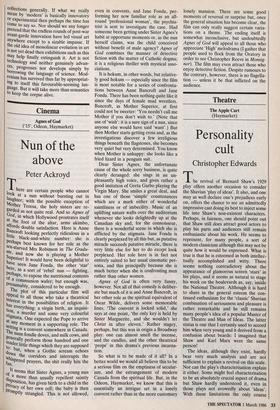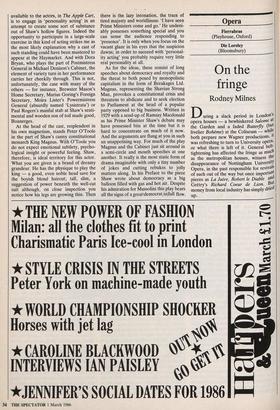Theatre
The Apple Cart
(Haymarket)
Personality cult
Christopher Edwards
The revival of Bernard Shaw's 1929 play offers another occasion to consider the Shavian 'play of ideas'. It also, and one may as well declare one's prejudices early on, offers the chance to see an admittedly impressive cast doing its best to inject some life into Shaw's non-existent characters. Perhaps, in fairness, one should point out that Shaw still does attract good actors to play his parts and audiences still remain enthusiastic about his work. He seems to represent, for many people, a sort of modern classicism although this may not be quite how it would be expressed. What is true is that he is esteemed as both intellec- tually accomplished and witty. There seems nothing contradictory about the appearance of glamorous screen 'stars' in his plays, and it seems as natural to stage his work on the boulevards as, say, inside the National Theatre. Although it is hard to share in the general esteem the con- tinued enthusiasm for the 'classic' Shavian combination of seriousness and pleasure is rather remarkable and he still remains many people's idea of a popular Master of the Theatre and Man of Ideas. The latter status is one that I certainly used to accord him when very young and it derived from a confusion about beards: I imagined that Shaw and Karl Marx were the same person!
The ideas, although they exist, hardly bear very much analysis and are not sufficient to explain a revival on this scale.
Nor can the play's characterisation explain it either. Some might feel characterisation to be an absolutely crucial aspect of drama but Shaw hardly understood it, even in those plays not avowedly about 'ideas'. With these limitations the only course available to the actors, in The Apple Cart, is to engage in `personality acting' in an attempt to create some sort of substance out of Shaw's hollow figures. Indeed the opportunity to participate in a large-scale exercise in this kind of acting strikes me as the most likely explanation why a cast of such standing could have been mustered to appear at the Haymarket. And with Dora Bryan, who plays the part of Postmistress General in Michael Denison's Cabinet, the element of variety turn in her performance carries her cheekily through. This is not, unfortunately, the case with many of the others — for instance, Brewster Mason's Home Secretary, Marius Goring's Foreign Secretary, Moira Lister's Powermistress General (absurdly named `Lysistrata) or Paul Rogers's manful stab at Shaw's senti- mental and wooden son of toil made good, Boanerges.
At the head of the cast, resplendent in his own magnetism, stands Peter O'Toole in the part of Shaw's canny constitutional monarch King Magnus. With O'Toole you do not expect emotional subtlety, psycho- logical insight or powerful feeling. Shaw, therefore, is ideal territory for this actor. What you are given is a brand of dreamy grandeur. He has the physique to play the king — a good, even noble head save for the boyish blond haircut; tall, slim, a suggestion of power beneath the well-cut suit although, on close inspection you notice how his legs are growing thin. Then there is the lazy intonation, the trace of tired majesty and worldliness: 'I have seen Prime Ministers come and go.' He undeni ably possesses something special and you can sense the audience responding to `presence'. It is only when you focus on the vacant glaze in his eyes that the suspicion dawns; in order to succeed with 'personal- ity acting' you probably require very little real personality at all.
As for the ideas, these consist of long speeches about democracy and royalty and the threat to both posed by monopolistic capitalism in the form of Breakages Ltd. Magnus, representing the Shavian Strong Man, provokes a constitutional crisis and threatens to abdicate and to seek election to Parliament at the head of a popular party opposed to big business. Written in 1929 with a send-up of Ramsay Macdonald as his Prime Minister Shaw's debate may have possessed bite at the time but it is hard to concentrate on much of it now. And the arguments are flung at you in such an unappetising way. For much of the play Magnus and the Cabinet just sit around in a semi-circle and mouth speeches at one another. It really is the most static form of drama imaginable with only a tiny number of jokes and cutting rebukes to jolly matters along. In his Preface to the piece Shaw wrote about democracy as a big balloon filled with gas and hot air. Despite his admiration for Mussolini this play bears all the signs of a greatidemocrat,inifull flow.















































 Previous page
Previous page